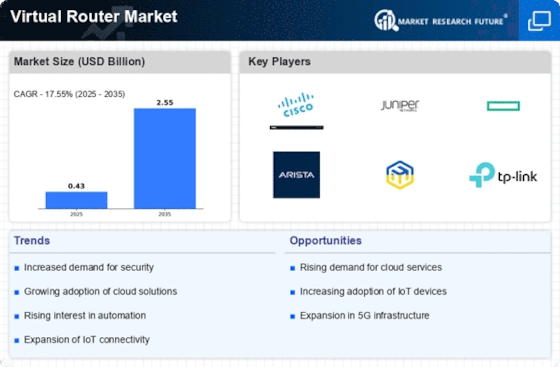Market Trends
Introduction
The Virtual Routers market is experiencing a significant transformation in 2023, driven by a confluence of macro-factors, such as the rapid advancement of technology, changing regulations, and changes in consumer behavior. The rise of cloud computing and the growing demand for agile network solutions are driving the adoption of virtual routers. Moreover, the growing regulatory pressure on data privacy and security is forcing companies to invest in more robust and compliant network solutions. In addition, consumers are increasingly demanding seamless and fast network connections. These trends are strategically important for the companies that want to maintain their competitiveness in a dynamic market. This report provides an analytical overview of the key trends that are transforming the Virtual Routers market, backed by data and insights from industry leaders.
Top Trends
-
Increased Adoption of SDN and NFV
The virtualized routers have been transformed by the shift to software-defined networks (SDNs) and network functions virtualization (NFVs). Cisco and Juniper are leading this transition, and by 2023 SDN deployments are expected to have grown by 30 percent. The trend will increase the flexibility of the network and reduce operating costs, allowing businesses to scale up their operations with greater efficiency. Combined with NFVs, future developments could include more integrated solutions. -
Rise of Edge Computing
Edge computing is putting pressure on virtual routers to process data at the edge. Leading vendors such as IBM are investing heavily in edge computing. This year, they expect to see a 40 percent increase in edge deployments. This trend reduces latency and increases application performance, especially in IoT applications. In the future, we expect to see a flurry of innovations in virtual routers to support real-time data processing at the edge. -
Enhanced Security Features
Virtual routers are introducing new security features as cyber threats evolve. In some cases, they are based on artificial intelligence. For example, some of the leading Chinese companies have incorporated these features, and their customers have reported a reduction in the number of security incidents by up to 25%. This trend is of particular importance to companies in regulated industries. Developments in the future may include the automation of security incident detection and response. -
Integration with 5G Networks
The introduction of 5G technology is having a significant impact on the virtual router market. Ericsson is the market leader in 5G-ready virtual routers. The expected increase in 5G deployments by 2023 will require virtual routers with higher throughput and lower latency. This trend is essential to support demanding applications such as augmented reality. Further developments may include more robust virtual routers designed for 5G environments. -
Cloud-Native Virtual Routers
The transition to cloud-native architectures is influencing the design of virtual routers. This year, the adoption of cloud-native virtual routers increased by 35%. This trend is helping companies to take full advantage of cloud resources and to reduce their costs. Future developments may focus on interoperability with different cloud platforms. -
Focus on Automation and Orchestration
The automation and orchestration of virtual routers are becoming the key to success, and the market leaders like Nokia are developing Artificial Intelligence-driven tools for the management of virtual routers. In 2023 the market for automation of network management grows by twenty percent. This trend simplifies the operation and reduces the error rate, which increases the performance of the entire network. The next step could be more complex orchestration tools, which can be connected to existing IT systems. -
Growing Demand for Multi-Cloud Solutions
IT companies, as they adopt a multi-cloud strategy, are in need of virtual routers which can connect different cloud environments. Enterprises such as HPE are responding to this need with a reported 30% increase in multi-cloud router solutions. This trend is expected to result in improved resource usage and increased flexibility for enterprises. Future developments might be directed at improving the interoperability between different cloud services. -
Sustainability Initiatives
A virtual router is a logical extension of the virtual switch. In the virtual switch market, energy conservation is becoming a priority. Brocade is the leader in this field. A study has shown that energy-conserving switches can reduce operating costs by up to 15%. This trend is crucial for companies that want to comply with the laws of the environment and the sustainable development goals of their companies. In the future, the use of more eco-friendly materials and designs in the manufacture of the router is expected to become a priority. -
Increased Customization and Flexibility
A demand for a virtual router tailored to a particular industry is growing, and netElastic Systems offers solutions for these needs. This trend will lead to a 25% increase in the number of custom-made virtual routers in 2023. Customization enables a company to optimize its performance according to its specific requirements and to enhance the customer experience. It is expected that in the future there will be a tendency towards more modularity, allowing for easy changes and improvements. -
Collaboration with Telecom Providers
The association of virtual router makers and telecommunications companies is becoming increasingly common, with Cisco collaborating with the major carriers. The result is an increase of 15% in the number of joint solutions for improving the quality of the network. Such collaborations enable faster implementation of advanced network solutions. Future developments may include more integrated solutions for telecommunications operators that combine both hardware and software.
Conclusion: Navigating the Competitive Virtual Router Landscape
The Virtual Routers market in 2023 is characterized by intense competition and a large degree of fragmentation. The market is being contested by both the old and the new players. The regional trends show a growing demand for advanced networking solutions, especially in North America and Asia-Pacific, where digital transformation is accelerating. Strategically, vendors are using capabilities such as data analytics based on AI, automation to optimize operational efficiency and green solutions to meet the needs of the growing number of consumers with an awareness of the environment. As a result, they will be able to offer flexible and scalable solutions that can grow with the organization. As the market matures, it is the ability to take advantage of these capabilities that will help companies to navigate the complexity and seize the opportunities in the constantly changing environment.


















Leave a Comment